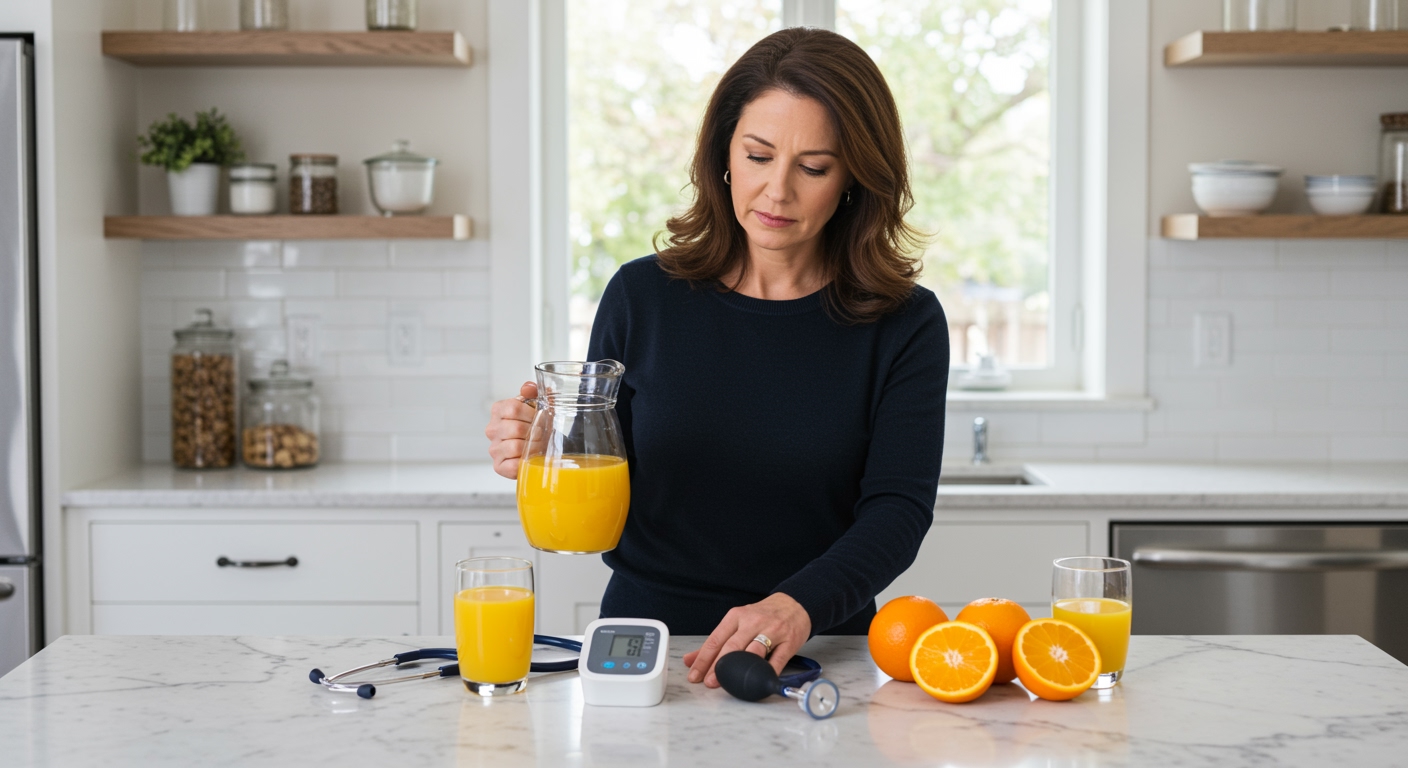✪ Key Takeaway: Orange juice can worsen low blood pressure due to its high sugar content and lack of sodium.
Introduction
Your morning glass of orange juice might seem like a healthy choice, but it could be making your low blood pressure worse.
Many people with hypotension wonder if this popular breakfast drink will help or harm their condition, especially when they feel dizzy or weak in the mornings.
Hi, I’m Abdur, your nutrition coach, and today I’m going to explain exactly how orange juice affects your blood pressure and what you should drink instead.
How Does Orange Juice Affect Blood Pressure?
Orange juice contains natural sugars that cause your blood sugar to spike rapidly after drinking it.
This sugar rush triggers your body to release insulin, which can cause your blood vessels to relax and your blood pressure to drop even lower.
The potassium in orange juice also plays a role in lowering blood pressure by helping your kidneys remove excess sodium from your body.
While potassium is beneficial for people with high blood pressure, it can be problematic for those with hypotension who need their blood pressure to stay stable or increase slightly.
Research shows that citrus flavonoids like hesperidin found in oranges can improve blood vessel function, but this improvement often results in lower blood pressure readings.
✪ Fact: One cup of orange juice contains about 496 mg of potassium, which is more than a medium banana.
What Happens When You Drink Orange Juice With Low Blood Pressure?
When you have low blood pressure and drink orange juice, you might experience dizziness or lightheadedness within 30 minutes.
The rapid blood sugar spike followed by a crash can make you feel weak, shaky, or even nauseous.
Your body struggles to maintain adequate blood flow to your brain and organs when your blood pressure drops too low after consuming high-sugar beverages.
Some people with postural hypotension find that drinking orange juice makes their symptoms worse when they stand up quickly.
The lack of sodium in orange juice is another problem because people with low blood pressure often need more salt to help maintain their blood volume.
Your kidneys work harder to process the excess fluid from orange juice, which can further reduce your blood pressure through increased urination.
✪ Note: Symptoms of worsening low blood pressure usually appear 15-45 minutes after drinking orange juice.
Are There Any Benefits of Orange Juice for Low Blood Pressure?
Orange juice does provide some vitamin C and antioxidants that support overall cardiovascular health.
The folate in orange juice helps your body produce red blood cells, which can improve oxygen delivery throughout your body.
However, these benefits are minimal compared to the potential risks for people with hypotension.
The quick energy from natural sugars might temporarily help you feel more alert, but this effect is short-lived and often followed by a crash.
Some people find that diluting orange juice with water reduces its impact on blood pressure, but this also reduces its nutritional value.
✪ Pro Tip: If you crave orange juice, eat a whole orange instead to get fiber that slows sugar absorption.
What Should You Drink Instead of Orange Juice?
Water with a pinch of salt is one of the best beverages for people with low blood pressure because it helps maintain blood volume.
Coconut water provides natural electrolytes including sodium and potassium in better balance for hypotension management.
Green tea contains caffeine which can temporarily raise blood pressure and improve alertness without the sugar crash.
Bone broth is excellent because it provides sodium and other minerals that help maintain healthy blood pressure levels.
Sports drinks with electrolytes can be helpful in moderation, especially if you exercise regularly or live in a hot climate.
Coffee in moderate amounts can also help raise blood pressure temporarily, but avoid adding too much sugar which can cause the same problems as orange juice.
✪ Fact: Adding just 1/8 teaspoon of salt to 8 ounces of water can help stabilize low blood pressure.
The Bottom Line
Orange juice is not a good choice for people with low blood pressure because it can make symptoms worse through its high sugar content and blood pressure-lowering effects.
Your morning beverage choice sets the tone for your entire day, so choose wisely to support your body rather than work against it.
I would love to hear about your experiences with different beverages and low blood pressure, so please share your questions or feedback in the comments below.
References
At NutritionCrown, we use quality and credible sources to ensure our content is accurate and trustworthy. Below are the sources referenced in creating this article:
- PMC: Citrus Flavonoids and Cardiovascular Health
- Florida Citrus: Heart Health Study Shows Orange Juice Benefits
- Health Central: Is Orange Juice Good for High Blood Pressure





